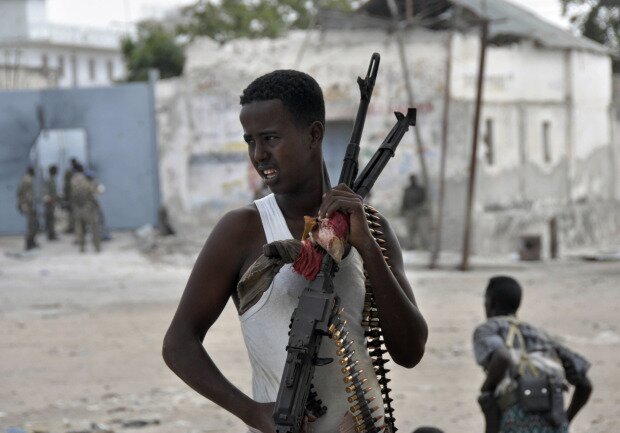Help Wanted
 BY OMAR ABDIRASHID ALI SHARMARKE
BY OMAR ABDIRASHID ALI SHARMARKE
In recent months, many in the United States seem to have given up on Somalia. In March, for example, the Council on Foreign Relations issued a special report calling for a “new†policy of “constructive disengagement†from our country — in other words, the withdrawal of international support for the Somali government. That idea is undoubtedly tempting to many in Washington, as well as in London and other Western capitals, given the difficulty of the problems we face as a government working to restore order across a hostile land. But this supposedly new approach would be as disastrous today as it has been in the past, both for Somalia and the international community.
In fact, “constructive disengagement†is a nice euphemism for the same very old and thoroughly failed policies that Western countries have used for years to wrongly argue that Somalia’s problems can remain in Somalia. This was the prevailing attitude of much of the international community during most of the past two decades — until rampant piracy drew navies from around the world toward Somali waters. The presence offshore of a flotilla of warships from the navies of more than two dozen countries illustrates vividly how our country’s internal problems are a pressing international issue.
The global nature of Somalia’s troubles is also visible on the ground, where an influx of foreign fighters is swelling the ranks of militant oppositionists who are openly aligned with al Qaeda. Hundreds of foreign militants are currently in Somalia, ostensibly to fight the Somali government alongside al-Shabab and Hizbul Islam, extremist groups that draw inspiration from some of the world’s most radical Islamist groups. Indeed, a recent Human Rights Watch report looking at life for Somalis in Shabab territory reads as if it could have come from the organization’s old file on Afghanistan’s Taliban. Extremists desecrate the graves of Somalis seen as somehow un-Islamic under their warped interpretation of Islam. Shabab authorities regularly issue edicts banning everything from flying our Somali flag to watching the World Cup, from ringing school bells to using tractors for farming. Shabab enforcers flog women for failing to wear head-to-toe garments, even though many families simply cannot afford them. These same extremists blew up medical students and professors at a graduation ceremony last year, and they are undoubtedly responsible for the five headless corpses found in April in Mogadishu. The victims had been working to construct a new Somali parliament building.
The world has seen this kind of savagery before, when the Taliban destroyed ancient Buddhist statues in Afghanistan and when al Qaeda-linked militants systematically bombed holy sites throughout Iraq. As the history of the past decade shows, the extremists in Somalia will also undoubtedly begin exporting violence throughout the region and around the world if we do not confront them. And indeed, Africans are taking the lead in this fight. The Somali government, backed by African Union peacekeeping forces, is gradually extending the rule of law in Mogadishu and elsewhere in Somalia. The hard fight on the ground is ours to win, but we need international support from afar to remain strong if we hope to succeed.
Yet nothing can be achieved without financial resources. And unfortunately, all sources of revenue that our government could have used have either collapsed or been destroyed. What Somalia needs most now from countries like Britain and the United States is financial support, not troops or peacekeepers. Our government is closely watching the events unfolding in Afghanistan, where U.S. and British soldiers are fighting bravely in a war we consider a distant front of our own. Somalis are eager to do their part in pushing back against the menace of Islamist extremism, but they lack the resources to do so. Support from the African Union and the United Nations is helping us stand up a proper army, but it is not enough. We need more support for our armed forces if we hope to win on battlefields in Mogadishu and across Somalia in the coming months.
Somalia also needs more international support for initiatives off the battlefield. We seek greater help in restoring legitimate commercial activity so that we can make the most of our vast potential wealth in fish, oil, gas, and minerals and someday fund long-term governance and development on our own. For now, we urgently need resources to establish and maintain public services, such as health care, education, water, and basic sanitation, in areas under government control. We know better than anyone what international navies are now learning the hard way: The best way to overcome terrorism and piracy is ultimately to fill the vacuum in which they thrive, namely the absence of state authority and good governance.
Our Transitional Federal Government was established in 2004. As the name makes clear, we will try our best to govern only until the people of Somalia can choose their leaders in an environment of peace, security, and hopefulness about the future. Contrary to what some believe, such a day is within reach, owing to the work our government has done already with help from the international community. But that day may never arrive if Somalia is again left standing alone.
_____
FP
Comments
comments
 Calendar
Calendar






































